Overview of Emotional Intelligence
What is the definition of Emotional Intelligence?
Emotional Intelligence is the capacity to acknowledge ones and others’ emotions, then leverage emotional information to adapt thinking and behavior to the environment and to achieve one’s goal. To begin with, in 1964, Michael Beldoch coined the expression in his article “The communication of emotional meaning”. Later, Daniel Goleman, a science journalist, popularized it in 1995, with his book Emotional Intelligence. At last, Emotional Intelligence is closely related to Emotional Quotient (EQ) also called Emotional Intelligence Quotient (EIQ).
- Overview of Emotional Intelligence
- Self-Awareness, the first competence of Emotional Intelligence
- Self-Regulation, the second competence of Emotional Intelligence
- Self-Control: managing our emotional state and response
- Trustworthiness: sticking to standards of honesty and integrity
- Conscientiousness: taking responsibility for personal performance
- Adaptability: flexibility in responding and handling change
- Innovation: being open and comfortable with novel ideas and approaches
- Motivation, the third competence of Emotional Intelligence
- What’s next? Learn more about Emotional Intelligence, Agile Leadership and discover Coaching
- Do you want to learn more about Emotional Intelligence? Here are some valuable references
Why Emotional Intelligence is important?
Today, intellectual capacities, measured with Intellectual Quotien (IQ) tests are not what makes the difference to success. Actually, the more a person has a leader role, the more important the Emotional Intelligence.
IQ alone leaves between 75 to 96% of the success at work unexplained. In other words, it does not determine who succeeds and who fails. Surely, it’s just a threshold of competence: you need it to get in the field, but it does not guarantee you a breakthrough success. As a matter of fact, Emotional Intelligence capacities make the difference. To put it differently, to succeed, you need to start with intellectual horsepower. But Emotional Intelligence is the catalyzer to full potential and talent blooming.
67% of the abilities that make the difference for top performers are emotional competencies. Clearly, it is twice as much compared to IQ and expertise. In addition, when in comes to Leadership, 90% of the success is attributed to Emotional Intelligence.
It is all the more important that there is little variance in IQ between professionals, but a huge variance in EQ. In addition, there is even a negative correlation for extreme high IQ that usually comes with lack of social skills then EQ. To put it differently, the IQ muscle usually strengthens at the expense of the muscle for personal and social skills.
The only cognitive ability that makes the difference for leaders is the capacity to see the big-picture and identify patterns. This enables them to see through the information’s noise, the trends, and think strategically for long term matters.
Can Emotional Intelligence be taught, learned and improved?
The good news is the Emotional Intelligence can be improved. For instance, a training program for financial advisors on Emotional Intelligence enabled them to improve performance by 8 to 20% in in comparison to the previous year.
Some Misconceptions about Emotional Intelligence
- Firstly, Emotional Intelligence does not just imply “being nice”.
- Secondly, Emotional Intelligence is not about giving free rein to feelings.
In truth, Emotional Intelligence means managing feelings to express them appropriately and effectively. At some moment, Emotional Intelligence may require not to be nice, but on the contrary confront someone with an uncomfortable but consequential truth.
What are the Emotional Intelligence key competences?
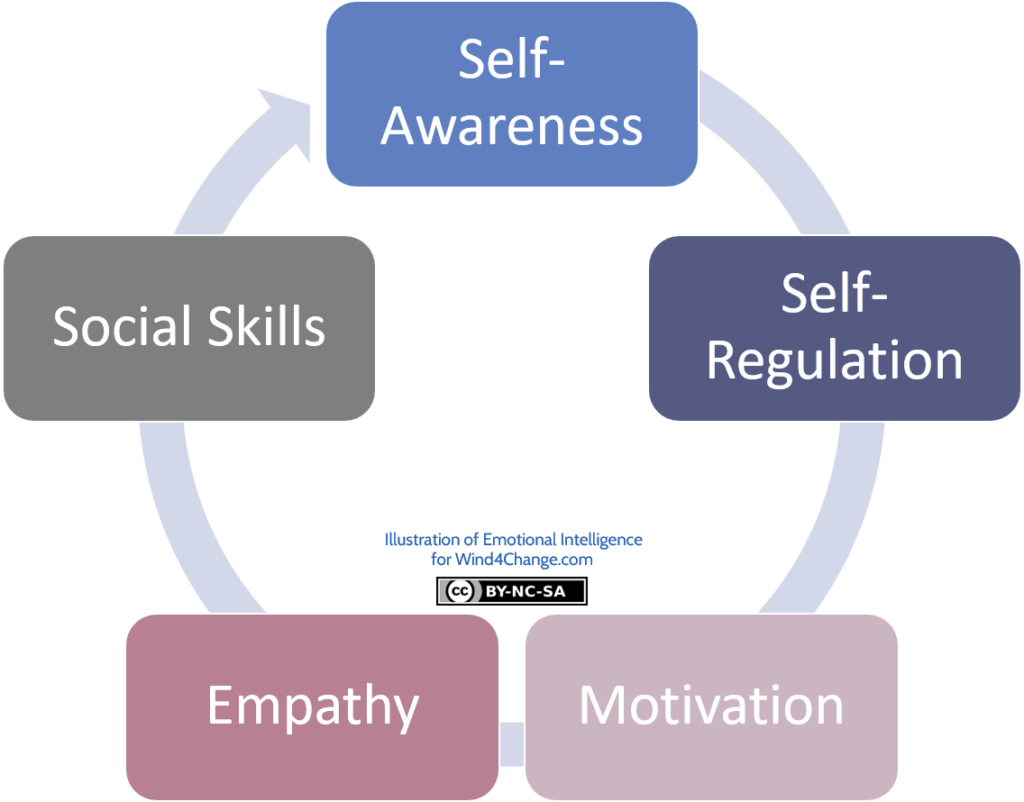
Emotional Intelligence, as described by Daniel Goleman, structures overs 5 competences: self-awareness, self-regulation, motivation, empathy, and social skills, aka adeptness in relationships.
Emotional intelligence skills have the following characteristics:
- Independent: each makes a unique contribution to performance.
- Interdependent: each pull the others to some extent.
- Hierarchical: Emotional Intelligence skills build upon each other. For instance, self-awareness is the prerequisite to self-regulation and empathy.
- Necessary, but not sufficient: for a person to demonstrate an Emotional Intelligence skill, the work environment climate and the person’s interest in doing so, are critical.
- Generic: Emotional Intelligence skills apply to all jobs. However, different jobs require in priority different Emotional Intelligence skills.
In this first post, we will focus on the Emotional Intelligence skills related to self-mastery. In other words, the competences to manage ourselves emotionally.
Self-Awareness, the first competence of Emotional Intelligence
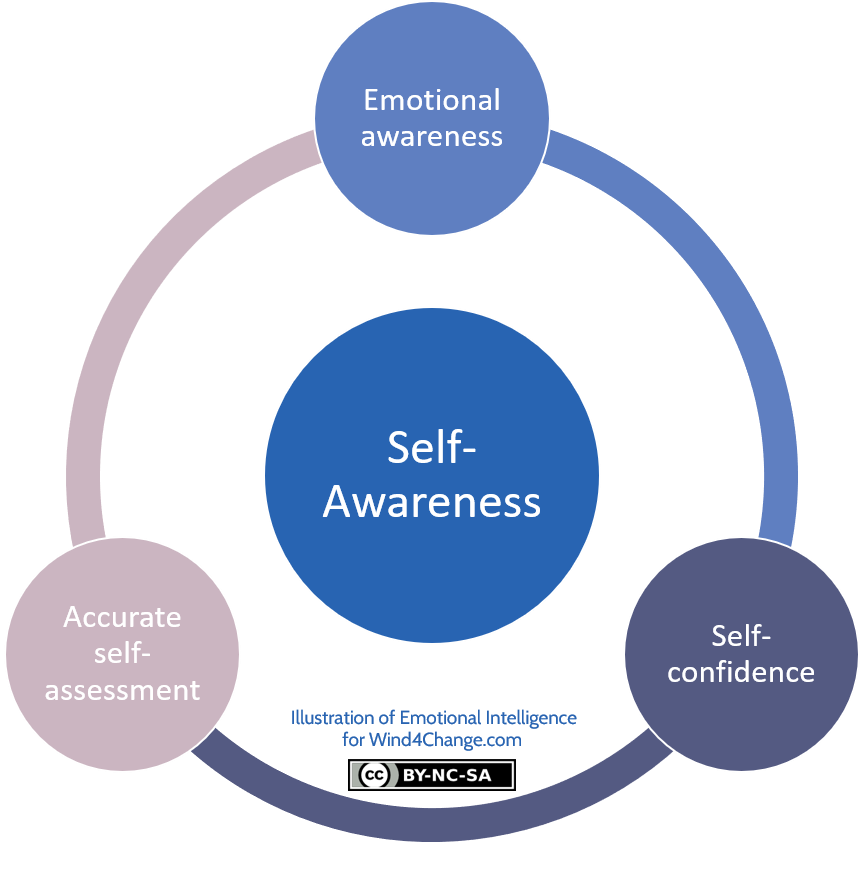
Emotions are everywhere in the way we think and act. Of course, we can balance that anchoring our decisions and acts in facts. So, we mitigate cognitive bias. But whatever hard we try to limit the impact of our emotions, they remain.
Actually, emotions are needed to take decisions. To illustrate, people who are injured in some areas of the brain where emotions generate, become incapable of taking relevant decisions. Indeed, they may pay 1 million dollars or euros for a common good. And I am not talking here about the extreme case where this common good may save their life.
So we have to deal with our emotions. And the first step is to be aware of them.
Emotional awareness: acknowledging our emotions and their effects
Are emotions are always with us, but we usually do not notice them except when they start to overwhelm us. Surely, if we pay attention, we can notice them at a lower level of intensity before they become too strong. Usually, this is possible only if we dedicate some quite time to focus on oneself. In addition, saving some time to review our emotions is a healthy practice. Indeed, persistent emotions are the indicator that we are aligned or not with our values and what we like. And this is part of what make us motivated. So, better listen to what our emotions are telling us about how what we do daily is aligned with what we want and need. Clearly, motivation, but also in some case health, are at stake.
This competence of Emotional Intelligence covers the following:
- Know which emotions we are feeling and why.
- Make the links between our emotions and what we think, say and do.
- Acknowledge how our feelings impact our performance.
- Understand the value and the goal that are behind our emotions so we can mitigate or address them properly.
Self-confidence: acknowledging our self-worth and skills
Self-confidence demonstrates with a strong self-presentation, a presence. In addition, highly self-confident people beam with charisma and inspire trust around them. In contrast, extreme self-confidence without social skills is what we call arrogance. Furthermore, self-confidence is different from boldness as it it keeps connected to reality.
Self-confidence makes it possible to speak up for the truth or the right even if it challenges the status quo or even disturbs the management. Moreover, self-confidence enables persistence in facing difficulties as people believe they can succeed thanks to their skills and hard work.
This competence of Emotional Intelligence covers the following:
- Present oneself with self-assurance. People feel oneself when there.
- Be able to speak up what is right but disturbing.
- Be decisive, in other words, be able to make sound decisions despite uncertainty and stakes.
Accurate self-assessment: recognizing one’s strengths and limits
Leaders like everybody have weaknesses. One of the difference between those who succeed and those who fail is the will and capacity to learn from mistakes and shortcomings. Clearly, this starts with acknowledging their own faults and not blaming others for them. In addition, as all of us may have blind spots, this requires to be open to feedback and look for it. To begin with, the first step is to create the conditions to get honest and constructive feedback. In truth, organization usually trades illusion of harmony and effectiveness against the truth that is required for genuine improvement.
This competence of Emotional Intelligence covers the following:
- Be aware of one’s strengths and weaknesses.
- Self-reflect and learn from experience.
- Listen openly to genuine feedback, new ideas, different points of view.
- Demonstrate a sense of humor and perspective about oneself.
Self-Regulation, the second competence of Emotional Intelligence
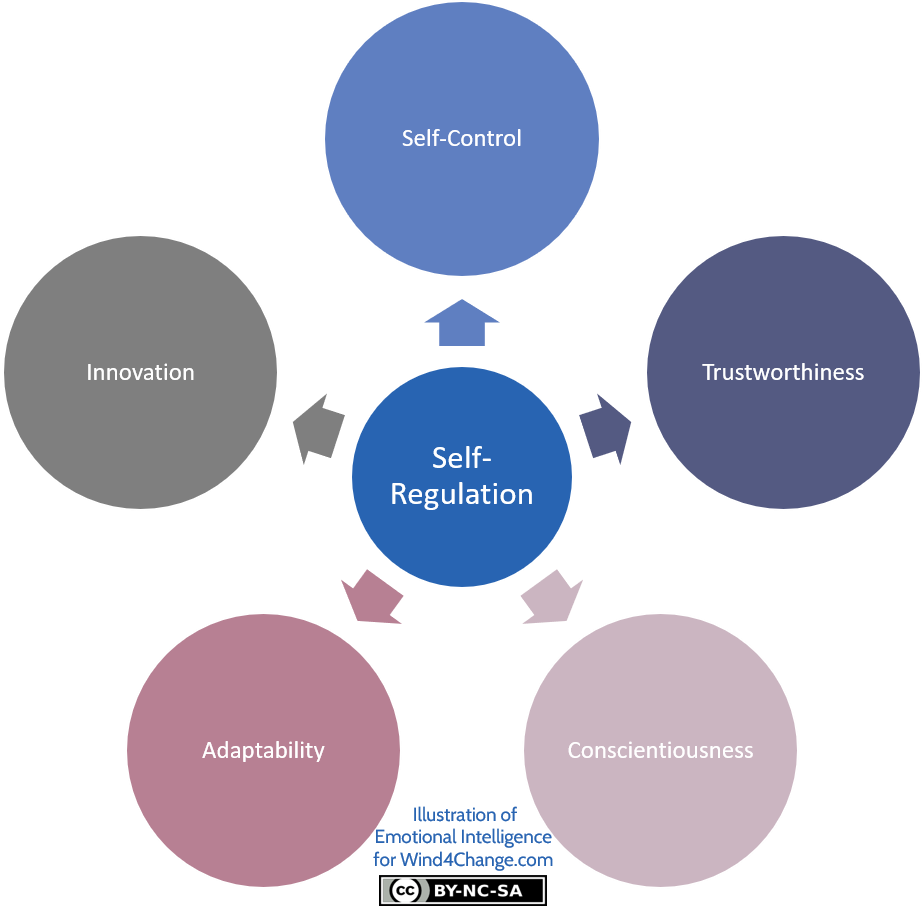
When our mind is calm, our cognitive capacities work at their best. But if we see or if we anticipate a threat, our body and our brain shift into a self-protective mode, preempting resources to ensure our survival. Today, it is uncommon that our life or our physical integrity are at risk. Yet, the same mechanisms happen in case of lower level threat.
So, in case of danger, the brain falls back in simple, highly familiar routines and responses. As a consequence, all complex thoughts, creative insights, and long-term planning are put aside.
When people master self-regulation, they react more proportionally to threats and they are able to recover from stress more quickly. In addition, these people are usually more optimistic and action oriented than the others. As a result, their answer to difficulties is with actions to fix them or at least to mitigate them, so they are manageable.
Furthermore, self-regulation is also about staying focused and ignoring distractions. Indeed, back thinking about worries also steals cognitive resources. This has the same effect than immediate an threat.
Nevertheless, self-control is not the same as over-control. Truly, there is room for feeling and spontaneity. But we decide how we express our emotions. In fact, over-control or better said hiding of emotions is not a good thing either. Surely, it has the same impact than overwhelming stress. Health is also at stake. So, here also it is a question of reacting more proportionally and be action oriented to get back some control.
Self-Control: managing our emotional state and response
Some stimulation is good as the body produces chemicals, catecholamines, adrenaline and noradrenaline, that generate enthusiasm. But over stimulation and stress, on the contrary, make the body produces cortisol. Clearly, this has a negative effect on our mind but also our body. Extreme stress can even has the opposite effect to stimulation, as we end out overwhelmed, paralyzed, or demoralized. So, the better we monitor our emotional upsets, the sooner we recover from distress.
This competence of Emotional Intelligence covers the following:
- Manage one’s emotions either impulse or distress.
- Stay calm and positive in challenging moment.
- Handle pressure to keep thinking clearly and stay focused.
Some options to lower our stress level and increase our recovery speed include:
- Regular practice of a relaxation method.
- Daily journal to take a step back and turn to action.
Trustworthiness: sticking to standards of honesty and integrity
This principle is about having values and sticking to them. Undoubtedly, self-confidence is a resource to leverage when this requires challenging the status quo.
This competence of Emotional Intelligence covers the following:
- Act ethically and above reproach.
- Build trust through one’s reliability and authenticity.
- Admit one’s own mistakes and confront unethical actions from the others.
- Take principled stands even if they are unpopular.
Conscientiousness: taking responsibility for personal performance
This practice is about being meticulous. Generally, conscientious people benefit some sort of aura that make them be perceived better than they actually are. Including from their manager. But this should come with empathy and social skills. Indeed, conscientious people demand a lot from themselves. So, they can expect the others to meet the same high standards. Ultimately, they may become judgmental to the others and trigger stress and conflicts.
This competence of Emotional Intelligence covers the following:
- Meet one’s personal commitments and keep promises. Note that this principles is different from the commitment one below. Indeed, this one is individual and the other one consists in meeting a group commitment.
- Take ownership of one’s objective to meet them.
- Be meticulous: organized and careful in one’s work.
Adaptability: flexibility in responding and handling change
This principle is about flexibility in action, react and adapt work, but also in perception, switch perceptive and accept different points of view. Here also, self-confidence is a valuable resource. Indeed, the prerequisite to flexibility is to stay calm and comfortable in face of ambiguity, uncertainty and unexpected events.
This competence of Emotional Intelligence covers the following:
- Be able to handle multiple demands and to shift priorities quickly.
- Adapt one’s responses to the environment.
- Be flexible in how one perceives the events.
Innovation: being open and comfortable with novel ideas and approaches
By nature the innovator is attracted to novelty and originality. As a result, his or her creative mind is a bit unruly. As a matter of fact, there is a natural tension between the need for order to enforce stability, and the need for disorder to generate innovation. Clearly, this should be understood, accepted and properly balanced to get the best of both. At last, innovation comes with risk taking.
Here we have another example on how emotional practices are interdependent. If expertise is mandatory to generate innovative ideas, it requires a web of influence over the organization to transform them in reality.
This competence of Emotional Intelligence covers the following:
- Seek out fresh ideas leveraging multiple sources of information.
- Create original solutions to problems.
- Generate new ideas.
- Take alternative perspectives and risks in one’s thinking and acting.
Motivation, the third competence of Emotional Intelligence
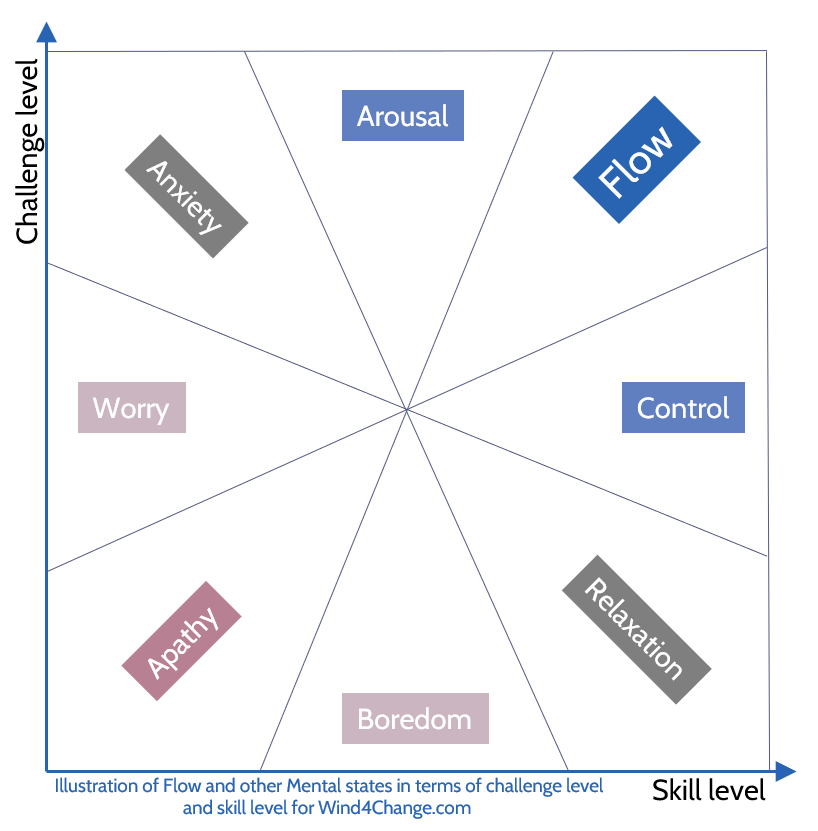
Motivation is the group of emotions that guide or facilitate reaching our goals. An example is the Flow.
The Flow is the mindset described by Mihaly Csikszentmihalyi where people are in a state of concentration and complete absorption in the task there are performing. In addition to feeling particularly alive and fulfilled by the task they are performing, people are also so absorbed that they loose conscious about time, effort and even themselves. Furthermore, their brain and skills work at their best to achieve the purpose of their work. In other words, the Flow state is an optimal state of intrinsic motivation with full immersion in the task on going.
At last, it is important to note that Flow occurs in the area between boredom and paralyzing anxiety. Some anxiety generated by a sense of urgency, mobilizes us. Too little urgency makes us apathetic, too much and we become overwhelmed by stress.
So, let’s review the 4 skills related to the Motivation competence.
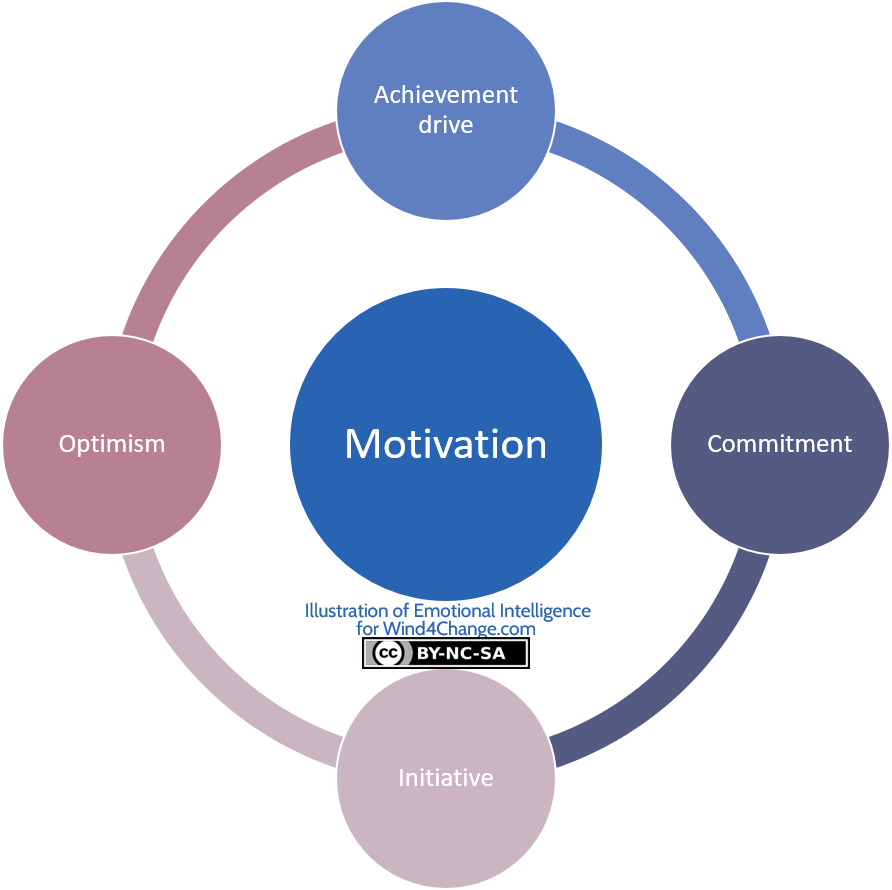
Achievement drive: struggling to reach our objectives and meet excellence
This practice is about self-commitment and drive to meet objectives and personal quality standards.
This competence of Emotional Intelligence covers the following:
- Be results-oriented with drive to meet one’s objectives and one’s quality standards.
- Set challenging goals and take calculated risks.
- Collect information to reduce uncertainty and to improve oneself.
- Self-reflect to improve.
Commitment: embracing and taking ownership of the goals of the group and the organization
Commitment principle about the commitment to the group’s and the organization’s mission and goal. So, it is different from Conscientiousness principle that is about taking responsibility for personal performance. Nevertheless, both are connected. Indeed, someone with strong Conscientiousness will be able to have strong Commitment. The prerequisite that our values or goals match the group’s and the organization’s ones. As a result, commitment comes naturally and is strong. On the contrary, mismatch may kill commitment even in someone committed by nature.
In addition, the group and the organization should treat people with respect and fairness. Surely, it is the first step before thinking about commitment. Actually, the more respect and fairness a group or an organization demonstrate to people, the more trust, loyalty and attachment they will have to this group or this organization.
This competence of Emotional Intelligence covers the following:
- Make sacrifices to meet the group and the organization goal.
- Find a sense of purpose in the group and the organization mission.
- Embrace the group’s and the organization’s values as demonstrated by choices and actions.
- Leverage opportunities to fulfill the group’s and the organization’s mission and goal.
Initiative: proactive mindset in ideas and actions
People with strong initiative, act so because they are convinced that their own actions have an impact on their environment. But this skill should come with empathy and an understanding of the big picture. So, coworkers or collaborators feel attractively pulled, not being pushed, used or passed over.
This competence of Emotional Intelligence covers the following:
- Be ready to leverage opportunities.
- Pursue goals beyond what’s required or expected by the group and the organization.
- Bend the rules when necessary to reach the goal.
- Transmit one’s energy to the others so they mobilize.
Optimism: persistence despite obstacles and setbacks
Optimism practice is another term for the Growth Mindset as described by Carole Dweck. It is the opposite to Fixed Mindset. Optimists, aka people with Growth Mindset, think that their talent and intelligence develop through efforts, learning strategies and the help of the others. On the contrary, people with Fixed Mindset consider their talent and intelligence to be innate. So, setbacks as seen as the demonstration of their limits.
This competence of Emotional Intelligence covers the following:
- Persist in progressing toward goals despite obstacles and setbacks.
- Be pulled by desire of success rather than pushed by the fear of failure.
- See setbacks as a normal price to pay, to pass trough difficulties, rather than a personal flaw.
What’s next? Learn more about Emotional Intelligence, Agile Leadership and discover Coaching
- Read my second post about Emotional Intelligence.
- Review my other posts on Agile Leadership.
- Discover coaching with my posts for instance on trust, feedback and active listening and on the GROW Model and the Powerful questions.
Do you want to learn more about Emotional Intelligence? Here are some valuable references
Introduction of concepts:
- The concept of Flow from Mihaly Csikszentmihalyi
- General information about Emotional Intelligence
The books about Emotional Intelligence from Daniel Goleman, one of the best expert on the topic:
- Emotional Intelligence: Why It Can Matter More Than IQ
- Working With Emotional Intelligence
A good post about tests and assessments to evaluate Emotional Intelligence.
